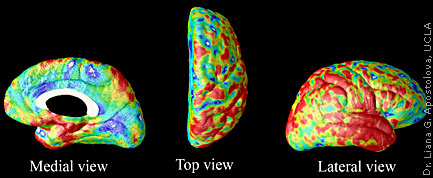Published: February 17, 2009
John Suchet is one of the U.K’s best known television newscasters. Before becoming a newscaster, John was a reporter for ITN. He has reported on momentous events such as the revolution in Iran, and he’s won awards as a newsreader.
Now John Suchet is talking publicly for the first time about one of the toughest events in his life. Dementia is slowly robbing him of his wife of more than 20 years.
How can he put this without sounding less than human? John Suchet wishes that his wife, Bonnie, had cancer. At this statement, his head drops and he covers his eyes with his hands. “I cannot believe I am saying these words. But it will give you some idea of how cruel her illness is. If she had cancer rather than dementia we would still be intimate and we would be figuring out how to fight the bloody thing.
Link to Telegraph article Related BBC Link
Source: Telegraph & BBC
Published: December 26, 2008

A 3-D image of brain atrophy differences in mild cognitive impairment (MCI) patients and mild Alzheimer’s disease patients. Alzheimer’s patients show far more damage overall, especially in cortical areas of the brain. Credit: Dr. Liana G. Apostolova, David Geffen School of Medicine at UCLA
A slow, chronic starvation of the brain as we age appears to be one of the major triggers of a biochemical process that causes some forms of Alzheimer’s disease. [continue reading…]
Published: October 8, 2008

© iStockphoto.com
No one knows how to prevent or delay Alzheimer’s disease. But researchers are finding clues to the mystery by studying exercise, estrogen, diet and drugs, and many other avenues.A special report on Alzheimer’s disease, a supplement to the October issue of Mayo Clinic Health Letter, describes focus areas in prevention research. They include: [continue reading…]
Being single when you reach middle age could mean more than having the house to yourself – it could increase your risk of dementia.
Living with a spouse or a partner decreases the risk of developing Alzheimer’s and other dementia diseases. This according to a study by Krister HÃ¥kansson, researcher in psychology at Växjö University and Karolinska Institutet, Sweden. The results were presented for the first time yesterday at the world’s largest dementia conference. [continue reading…]


